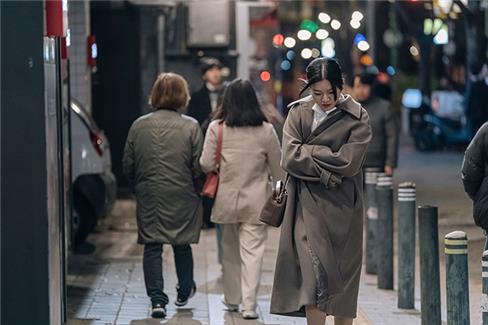- California Assembly OKs highest minimum wage in nation
- S. Korea unveils first graphic cigarette warnings
- US joins with South Korea, Japan in bid to deter North Korea
- LPGA golfer Chun In-gee finally back in action
- S. Korea won’t be top seed in final World Cup qualification round
- US men’s soccer misses 2nd straight Olympics
- US back on track in qualifying with 4-0 win over Guatemala
- High-intensity workout injuries spawn cottage industry
- CDC expands range of Zika mosquitoes into parts of Northeast
- Who knew? ‘The Walking Dead’ is helping families connect
(Movie Review) From discontent to new beginning: ‘Because I Hate Korea’ navigates life’s uncertain paths
The homegrown drama film “Because I Hate Korea” is as thought-provoking as it is painfully realistic.
The narrative, centered on the protagonist Gye-na (played by Ko A-seong), is so familiar to many Korean viewers that it might feel almost like a documentary about young people fresh out of college struggling to find their place and prove their worth in an extremely competitive society.
Scenes depicting common Korean experiences are likely to resonate deeply with local audiences: Gye-na’s boss ordering identical meals for everyone to reduce lunch wait times, her grueling two-hour commute to work and her family braving the cold in a dilapidated house awaiting renovation. Such episodes mirror the daily challenges faced by many ordinary Koreans.

Gye-na often feels like a Thomson’s gazelle on the African savannah, separated from the herd and lacking competitiveness, eventually becoming prey to a lion. She also sympathizes with the tale of Pablo the penguin, which, unable to bear the cold, embarks on an adventure to Hawaii by boat. Her inability to find meaning in working as just another part of a “cogwheel,” let alone understanding where it’s heading, only adds to her emotional suffering.
“I hate Korea,” Gye-na finally declares as she decides to leave. “I can’t stand living here anymore,” she says before setting off for New Zealand, leaving behind her long-time boyfriend, who represents another facet of the young generation — those who accept the harsh reality of life in Korea and strive to find contentment with what they have.
The irony of her brave declaration not to sit idle and resign to what she believes is an unfair and hopeless reality lies in the fact that she actually has no concrete plan and no one to turn to for help in the foreign country. Yet, she believes she can at least start with a clean slate there.

In New Zealand, she seeks new opportunities while living in a garage-turned-room, doing odd jobs and learning the language. Along the way, she befriends the free-spirited and optimistic Jae-in (Joo Jong-hyuk), who refuses to bow to unfavorable circumstances and bravely embraces new challenges.
Based on Chang Kang-myoung’s bestselling novel of the same name, the film conveys the simple truth that there is no definitive answer to happiness; instead, it’s an individual journey of building a life and finding joy along the way. There is no right or wrong, only choices.
The ensemble cast delivers compelling performances, bringing to life characters that viewers may find familiar from their own experiences. These portrayals could reflect the viewers themselves or people close to them, potentially mirroring paths that audience members have already walked.
Guided by Gye-na’s first-person narration, the film charts the transformation of her life and mindset through the various choices she makes, while also exploring the shifting circumstances and perspectives of those she left behind in Korea.
Like an engaging book that captivates its readers, the movie provides the audience with moments of reflection throughout its narrative. In the end, one might arrive at the same conclusion as Gye-na: the myth of happiness is overrated and what truly matters is following one’s own heart, regardless of where one lives.
The opening film of last year’s Busan International Film Festival, “Because I Hate Korea” is set for release on Wednesday.












